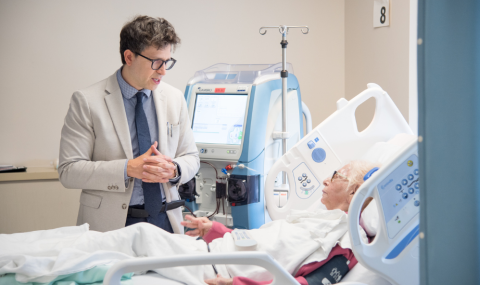July 23, 2025
The Middlesex-London Health Unit (MLHU) has declared an outbreak of Legionnaires’ disease in the London area. This is a serious type of pneumonia caused by Legionella bacteria, which people can get by breathing in mist or vapour from contaminated water sources.
The bacteria can grow in places like hot tubs, cooling towers, plumbing systems, fountains, and parts of air conditioning systems in large buildings. It does not spread from person to person. Those most at risk include people over 65, individuals with weakened immune systems, and those with chronic lung conditions.
Legionnaires’ disease and LHSC
The MLHU has confirmed that LHSC is within the six-kilometre area where most local cases of Legionnaires’ disease have been found. On July 16 and 17 samples were taken from Victoria Hospital’s cooling towers and air-conditioning systems.
Yesterday, we learned that Victoria Hospital’s cooling towers tested positive for Legionella bacteria on an initial screening test. More testing is now underway to find out if it matches the strain causing the community outbreak. Those results will take approximately three weeks.
For now, after discussions with MLHU clinical leadership, we want to be clear: this does not mean Victoria Hospital is the source of the community outbreak. During these same discussions we have been informed the risk to patients, staff, and visitors remains very low. At this time, there is no reason to suspect that the risk is any greater at Victoria Hospital than anywhere else within the six-kilometer zone.
As soon as we learned of the positive result, we initiated a chemical clean of the cooling towers. A systematic terminal clean will follow. These steps are being taken out of an abundance of caution to protect everyone’s health and safety.
Staff safety
Staff are encouraged to perform individual point of care risk assessments when seeing patients. If your risk assessment supports the use of PPE, it is available to you. The MLHU and our Infection Prevention and Control team are not currently recommending universal masking for either patients or staff.
Symptoms to watch for
Legionnaires' disease can have symptoms like many other kinds of pneumonia, so it can be hard to diagnose at first. Signs of the disease can include:
- Fever
- Chills
- Dry cough
Some people may also suffer from:
- Muscle aches
- Headaches
These symptoms usually begin two to ten days after coming into contact with the bacteria. Most people exposed to the bacteria do not get sick. As it is not transmitted from person to person, an individual diagnosed with Legionnaires' disease in the workplace is not a threat to others who share office space or other common areas.
We will continue to keep the community informed as we learn more.
For more information, please contact:
Jess Brady
Media Relations Consultant
London Health Sciences Centre
226-927-7486
media@lhsc.on.ca


